Select Language
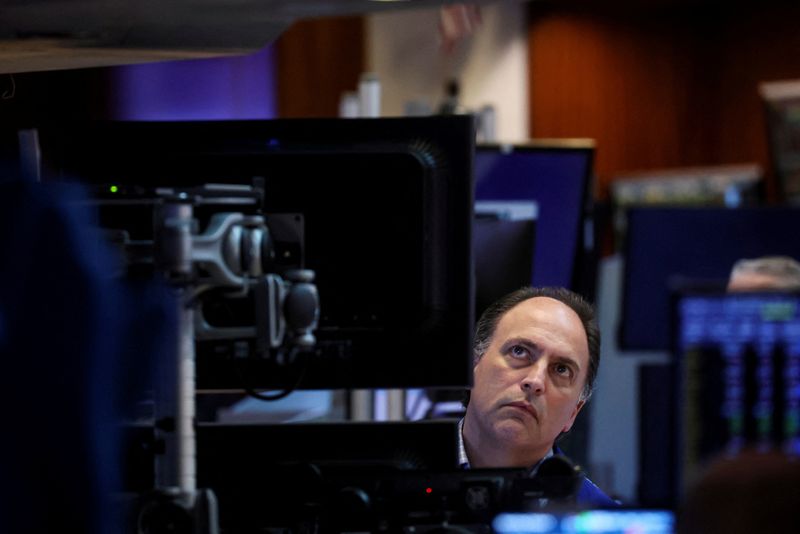
Investing.com -- It’s set to be an action-packed week in markets with U.S. jobs and GDP data along with a slew of big tech earnings. With markets in the final stretch before the U.S. presidential election plus the Federal Reserve’s November meeting volatility looks set to continue. Here's your look at what's happening in markets for the week ahead.
1. Nonfarm payrolls
Friday’s employment report is expected to show that jobs growth slowed to a more modest 111,000 in October, reflecting the impact of strikes (at Boeing (NYSE:BA), Textron (NYSE:TXT), and Hilton Hotels) and weather-related disruptions from Hurricane Helene and Milton. The unemployment rate is forecast to remain unchanged at 4.1%.
The Fed has already telegraphed its intention to cut interest rates by 25 basis points at its November meeting after delivering a 50-bps cut in September, but this week’s economic data could still have some bearing on that decision.
While Fed officials will likely look through temporary factors affecting payroll numbers, Tuesday's JOLTS data for September and Thursday's report on initial jobless claims will be closely watched for any signs of softening in the labor market.
2. GDP data
The other major data releases that the Fed will pay close attention to in the coming week are Wednesday’s first estimate of third quarter gross domestic product and Thursday's report on personal income and spending, which contains the central bank’s preferred inflation measure, the core PCE price index.
Economists are expecting the economy to have expanded at a solid 3% annual rate, matching the rate of growth in the previous quarter.
The economic calendar also features October data on consumer confidence and business sentiment, a report on pending home sales and the Institute for Supply Management is to release its October manufacturing index.
Fed officials will be in a communications blackout ahead of the November 7 policy meeting.
3. Megacap earnings
Five of the "Magnificent Seven" tech stocks that have played an outsize role in driving market gains over the past couple of years are set to report in the coming week.
Google parent Alphabet (NASDAQ:GOOGL) is due to report on Tuesday, followed by Microsoft (NASDAQ:MSFT) and Facebook parent Meta Platforms (NASDAQ:META) on Wednesday and Apple (NASDAQ:AAPL) and Amazon (NASDAQ:AMZN) on Thursday.
The companies have a huge influence on markets because of their massive market values. They jointly account for 23% of the weight of the S&P 500, meaning market reaction to their results could sway broader indexes in the days ahead.
Tesla (NASDAQ:TSLA), the first of the Magnificent Seven to report results, saw its shares surge on Thursday after CEO Elon Musk said he expects vehicle sales to grow 20% to 30% next year.
Taken together, the companies have posted much stronger profit growth than the rest of the S&P 500, but that gap is expected to close in coming quarters.
4. Market swings
This week will be the final full week in markets ahead of the Nov. 5 U.S. presidential election and the Fed’s next monetary policy decision on Nov. 7, which means investors will likely remain on edge.
Republican presidential candidate Donald Trump and his Democratic rival, Vice President Kamala Harris are tied in national and swing state polling, but former president Trump has improved his margins in recent weeks. The former president is also a slight favourite in election prediction markets.
"Investors should expect market volatility in the lead-up to the U.S. presidential election," analysts at UBS Global Wealth Management said in a note on Thursday. As Nov. 5 "inches closer, market sentiment is likely to stay vulnerable."
5. Oil prices
Oil prices are likely to fall when trading resumes on Monday after Israel's retaliatory strike on Iran over the weekend bypassed Tehran's oil and nuclear infrastructure and did not disrupt energy supplies.
Brent and U.S. West Texas Intermediate crude futures gained 4% last week in volatile trade as markets priced in uncertainty around the extent of Israel's response to the Iranian missile attack on Oct. 1 and the upcoming U.S. election.
Iran on Saturday downplayed Israel's air attack against Iranian military targets, saying it caused only limited damage.
Meanwhile, energy traders are awaiting more clarity on China's stimulus policies, though analysts do not expect such measures to provide a major boost to oil demand.
-Reuters contributed reporting
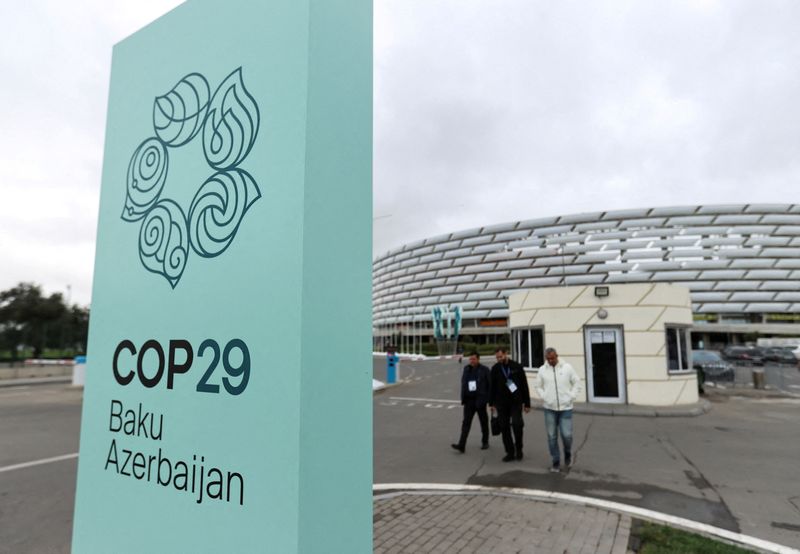
By Kate Abnett
BRUSSELS (Reuters) - The leading U.N. body on climate change is experiencing a severe budget shortfall, according to a Reuters analysis of documents from the world body - a funding gap that diplomats said could impair international climate dialogue.
The analysis found a budget hole of at least 57 million euros ($61.53 million) for 2024 - or nearly half of the funding needed for the U.N. Framework Convention on Climate Change (UNFCCC) secretariat to run annual climate negotiations among nearly 200 countries and to help implement any agreements that are made.
Budgets set out for the UNFCCC span two years. Its total 2024-2025 budget - the body's three main budget lines combined - is for 240 million euros, with about half of that expected to be allocated for this year.
The UNFCCC's member countries signed off on the budget and are expected to contribute the funds. The budget includes a core fund into which these countries are obligated to contribute, a supplementary fund drawing voluntary donations, and another voluntary fund to help diplomats from poorer countries attend U.N. climate negotiations.
While a handful of countries such as Japan and Germany have exceeded their payment obligations, others - notably the United States and China, the world's two biggest economies and the top emitters of greenhouse gases - have not yet met theirs. Contributions are due on Jan. 1 each year.
The secretariat, set up under the 1992 UNFCCC treaty, is the world's key body for coordinating international efforts to reduce climate-warming emissions and staging summits where countries can hold one another accountable.
The budget shortfall has forced it to curtail activities – from reducing operating hours at its headquarters in Bonn, Germany, to cancelling regional "climate week" events this year. Those regional summits in countries such as Kenya and Malaysia last year raised billions of dollars in investment pledges from governments, investors and philanthropies for renewable energy, reforestation and other climate-focused projects.
"We continue to work relentlessly, but our resources are increasingly over-stretched," said a UNFCCC spokesperson, who asked not to be named, in response to the Reuters analysis.
Germany's climate envoy Jennifer Morgan urged countries to find a solution.
"We need a climate secretariat that can perform its functions," Morgan told Reuters. "We're facing a massive crisis around the world."
RECORD PAYMENT DELAYS
As of this month, the UNFCCC had received 63 million euros ($68 million) in contributions for 2024.
Officials in the United States and China told Reuters the countries would make their payments this year but did not specify when. State Department spokesperson Melvin Felix said the United States "still intends to provide a substantial contribution" to support the secretariat this year. The Chinese foreign ministry said China "will fulfil its obligations as always."
As of October, the United States still owed 7.3 million euros to the UNFCCC's 2024 core budget, though it has contributed 2.5 million euros to its supplementary budget. China still owed 5.6 million euros to the core budget, though it has contributed 497,000 euros to the supplementary fund.
Even if both countries meet their obligations this year, it would not be enough to cover the hole in the UNFCCC's overall budget.

Investing.com-- Gold prices fell slightly in Asian trade on Friday, remaining in sight of record highs hit earlier this week as anticipation of a tight U.S. presidential election kept traders biased towards safe havens.
While the yellow metal did notch new highs, it struggled to hold its peaks amid pressure from a stronger dollar and higher Treasury yields. Still, gold was set for mild weekly gains in its third consecutive week of gains.
Safe haven demand was also boosted by persistent concerns over worsening geopolitical conditions in the Middle East.
Spot gold fell 0.4% to $2,724.55 an ounce, while gold futures expiring in December fell 0.4% to $2,737.05 an ounce by 00:30 ET (04:30 GMT). Spot gold was set to rise about 0.2% this week after hitting a record high of $2,758.53 an ounce.
Election, M.East jitters keep gold underpinned.
Safe haven demand for gold was buoyed by uncertainty over the U.S. election, with less than two weeks left to the ballot.
Republican nominee Donald Trump was seen gaining an edge over Vice President Kamala Harris, according to recent polls and prediction markets.
But with the race still too tight to call, markets remained largely risk-averse, fueling demand for gold.
Increased tensions in the Middle East also dented risk appetite, after Israel presented a harsh rhetoric against Iran this week. Markets are awaiting a retaliatory strike by Israel against Tehran over an early-October attack.
A particular point of concern is that Israel will attack Iran’s oil and nuclear facilities, which could mark a dire escalation in the conflict.
The conflict between Israel and Hamas and Hezbollah also showed little signs of de escalation, despite persistent U.S. attempts to broker peace.
Other precious metals fell on Friday. Platinum futures sank 1.5% to $1,022.95 an ounce and were trading flat for the week, while silver futures fell 0.5% to $33.635 an ounce, but were up 1.2% this week.
Copper falls, set for fourth week of losses
Among industrial metals, copper prices fell on Friday and were headed for a fourth week in red as pressure from the dollar and doubts over Chinese stimulus measures pressured the red metal.
Benchmark copper futures on the London Metal Exchange fell 0.3% to $9,535.50 a ton, while December copper futures fell 0.5% to $4.3457 a pound. Both contracts were down about 1% this week.
A meeting of China’s National People’s Congress, which was supposed to provide more cues on fiscal stimulus, appeared to be delayed to November from late-October.
China- the world’s biggest copper importer- had announced a slew of major stimulus measures over the past month. But the measures did little to improve sentiment, as traders sought more details on the timing and scale of the planned measures.
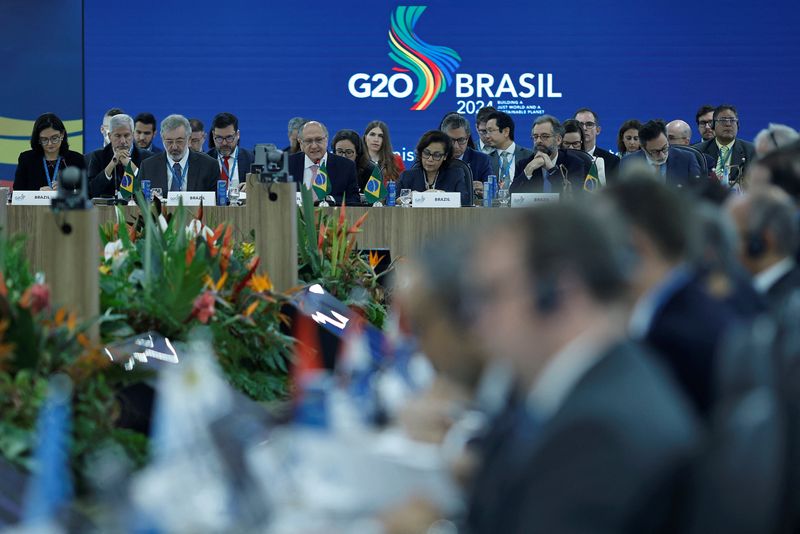
BRASILIA (Reuters) - Ministers from the G20 group of largest economies agreed on Thursday that international trade and investments should foster sustainable development and enhance the participation of women in world trade.
They also agreed on the need to speed up reform of the World Trade Organization to achieve a "faster, more agile and effective," conflict resolution system, Brazil's Vice President and Trade Minister Geraldo Alckmin told reporters.
The proposals agreed by G20 trade ministers meeting in Brasilia will be proposed to the group's leaders at the annual summit hosted by Brazil in November in Rio de Janeiro and be annexed to their joint statement.
It is the first time the G20 has addressed the issue of increased inclusion of women in international trade, Alckmin said, adding that Brazilian President Luiz Inacio Lula da Silva had insisted on it becoming a G20 principle.
Brazil, which will host the COP30 climate talks next year, also gave priority to the need to fight climate change and proposed that the G20 should call for trade and investments that encourage environmentally sustainable economic development.
Lula has also made reform of global governance institutions a priority and the ministers agreed to support WTO reform and the strengthening of a multilateral trading system, a Brazilian government statement said.
"We stressed the importance of a rulesbased, non-discriminatory, fair, open, inclusive, equitable, sustainable and transparent multilateral trading system, with the WTO at its core. We will work to ensure a level playing field and fair competition to foster a favorable trade and investment environment for all," the statement said.
The one-day meeting avoided divisive issues, though members expressed their views on Russia and Ukraine and the situation in Gaza, with some wanting them discussed in the G20 and others saying it was not the right forum, the Brazilian statement said.
"There were disagreements in drafting the texts and things were dropped, but at the end there was consensus on everything, including the proposal on women in international trade," said an Asian diplomat who attended the meeting.
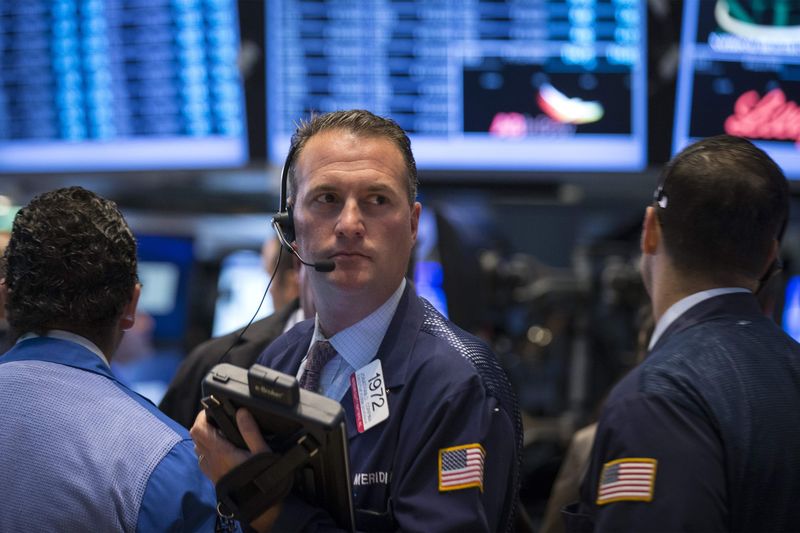
Investing.com-- U.S. stock index futures moved little in evening deals on Thursday as investors hunkered down before a string of major technology earnings in the coming week.
While Wall Street indexes rose tracking positive earnings from Tesla Inc (NASDAQ:TSLA), they were still nursing losses for the week amid persistent anxiety over the upcoming presidential election and expectations of slower rate cuts.
Risk appetite was also quashed by fears of worsening geopolitical conditions in the Middle East, as Israel prepared a strike against Iran.
S&P 500 Futures steadied at 5,847.25 points, while Nasdaq 100 Futures fell 0.1% to 20,365.75 points by 19:30 ET (23:30 GMT). Dow Jones Futures steadied at 42,591.0 points.
Mega tech earnings due in the coming week
The third-quarter earnings season is set to peak next week with five of Wall Street’s so-called “Magnificent Seven” set to report earnings.
Alphabet Inc (NASDAQ:GOOGL) will report on Tuesday, followed by Meta Platforms Inc (NASDAQ:META) and Microsoft Corporation (NASDAQ:MSFT) on Wednesday. Apple Inc (NASDAQ:AAPL) and Amazon.com Inc (NASDAQ:AMZN) will then report on Thursday.
The five firms represent a large chunk of overall market capitalization in Wall Street, with their earnings likely to act as a bellwether for the broader market. Focus will be squarely on whether artificial intelligence proved to be a major earnings driver, especially amid increased capital expenditures on the fast-growing sector.
Positive earnings from Tesla this week spurred some optimism over the upcoming reports. Tesla rallied nearly 22% on Thursday, and fell 1% in aftermarket trade.
Beyond the Magnificent Seven, a barrage of other Wall Street majors are set to report next week, including Advanced Micro Devices Inc (NASDAQ:AMD), Caterpillar Inc (NYSE:CAT), Visa Inc (NYSE:V), Ford Motor Company (NYSE:F), and Uber Technologies Inc (NYSE:UBER). Focus will be on whether corporate earnings were able to weather headwinds from sticky inflation and high interest rates, after a mixed batch of earnings in the past week.
Wall St nurses weekly losses
While Wall Street indexes advanced on Thursday, they were still down between 0.4% and 2.1% this week, as risk appetite remained frail. U.S. stocks were also subject to some profit-taking after hitting a series of record highs earlier in October.
The S&P 500 rose 0.2% to 5,809.86 points, while the NASDAQ Composite rose 0.8% to 18,413.91 points on Thursday. The Dow Jones Industrial Average lagged, falling 0.3% to 42,374.36 points, and was also the weakest performer among its peers this week.
Markets were spooked by rising Treasury yields, as investors positioned for a slower pace of rate cuts by the Federal Reserve. Increased odds of a Donald Trump presidency, over Kamala Harris, also saw markets positioning for inflationary U.S. policies in the coming years.
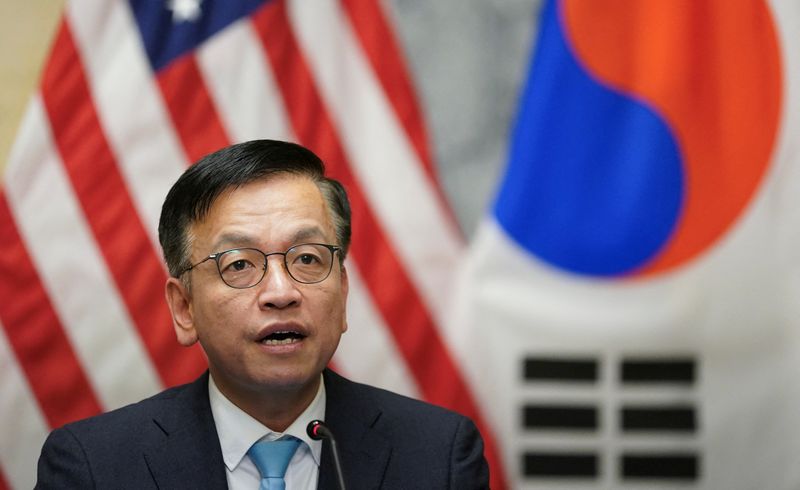
SEOUL (Reuters) - South Korea's finance minister said the downside risk to the government's forecast of 2.6% for this year's economic growth had expanded, the Yonhap news agency reported on Friday.
Economic growth is likely to be still higher than the potential growth rate, Minister Choi Sang-mok said in a meeting with reporters in Washington D.C., according to the report.
International organisations, such as the International Monetary Fund (IMF) and the Organisation for Economic Co-operation and Development (OECD), estimate South Korea's annual potential growth rate to be around 2%. South Korea's economy barely grew in the third quarter as consumer spending showed signs of recovery but exports declined, data showed on Thursday.
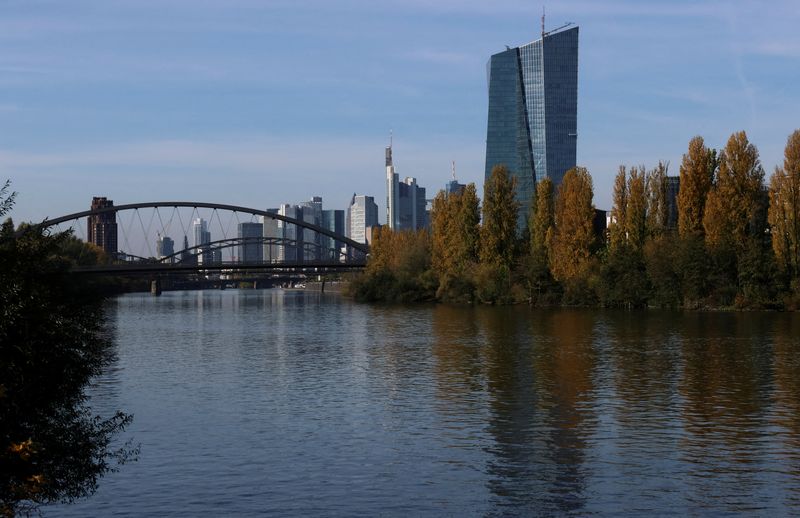
(Reuters) - The European Central Bank (ECB) will probably cut interest rates by a quarter-point in December, Bloomberg News reported on Thursday in an interview with ECB policymaker Robert Holzmann.
"I'd say a quarter-point step is probable in December,” Holzmann told Bloomberg.
"A bigger half-point cut is unlikely though not impossible. But we might also conclude that preemptively cutting in October might have been sufficient to take a break in December,” Bloomberg reported Holzmann saying.
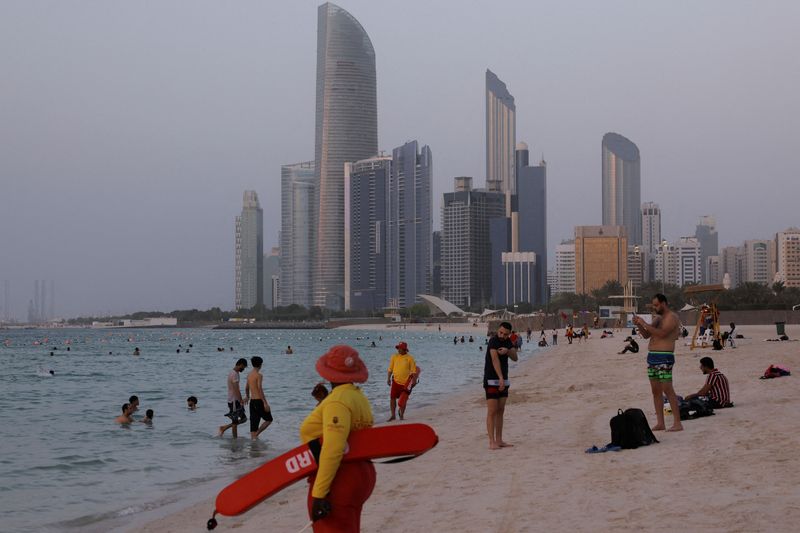
By Nell Mackenzie, Federico Maccioni and Hadeel Al Sayegh
DUBAI (Reuters) - Abu Dhabi is emerging from Dubai's shadow as it attracts its own share of asset managers' and billionaires wealth, helping cement United Arab Emirates' role as an alternative to global financial hubs.
Lacking rich oil reserves, Dubai has built up over the past two decades its position as the region's No. 1 financial centre, with its allure of low taxes, the application of English common law and exposure to the region's brisk economic growth.
Globally, Dubai ranks 16th in the latest tally from the Global Financial Centres Index, while Abu Dhabi is 35th, with both number one and two, respectively, for the Middle East and Africa region.
But over the past few years Abu Dhabi, which holds 90% of UAE's oil reserves, has accelerated efforts to diversify its economy, leaning on its vast wealth and sovereign funds that together manage almost $2 trillion to boost non-oil growth.
The emergence of companies in a range of new sectors and potential for business created by Abu Dhabi's investments have not gone unnoticed in the international financial community.
"It's completely changed in the past year, there's been an influx of money managers, hedge funds, alternatives etc. coming to conferences to raise funds here," said Ryan Lemand, co-founder and CEO of Abu Dhabi-based fund management and investment advisory firm, Neovision Wealth Management.
Some have already set up shop in Dubai, or increasingly, Abu Dhabi to gain an edge over those travelling from London, New York, or Hong Kong to drum up new business.
Lemand was speaking ahead of this week's Alternative Investment Management (AIM) Summit in Dubai that drew hundreds of institutions from across the globe, including names like Brevan Howard and JPMorgan Asset Management.
While statistics for both centres are not entirely comparable, they show Dubai remains well ahead. The Dubai International Financial Centre currently has so far over 420 wealth and asset management firms operating in the city, its head of wealth and asset management said at the AIM conference. There were no recent figures for Abu Dhabi and data from end of June showed 112 fund firms registered there.
The latter, has clear momentum, though, according to eight attendees of the AIM Summit.
NEW ARRIVALS
They cited rising company registrations, the draw of sovereign wealth funds and the ease of obtaining a license to operate compared with other financial centres and now at par with Dubai's. They spoke on background because the subject matter was sensitive to their business.
Billionaire Ray Dalio, founder of hedge fund Bridgewater Associates, and other hedge funds including Brevan Howard are among those who now have a presence in Abu Dhabi. Asset managers PGIM, the investment management arm of U.S. insurer Prudential Financial (NYSE:PRU), and Nuveen are also new additions.
General Atlantic, a New York based private equity firm with $83 billion under management, is also set to join after it received preliminary approval.
A further dozen or so asset managers and hedge funds have been approved in principle, according to data from Abu Dhabi Global Market, the city's financial centre.
Abu Dhabi is the world's richest city when measured by the assets held by sovereign wealth funds, sitting on $1.7 trillion, with such funds managing around $500 billion in Dubai, according to a Global SWF report released earlier this month.
An employee at one investment firm, who declined to be named, said the bigger presence of sovereign wealth funds served as an incentive to set up in Abu Dhabi.
For both centres the ease and clarity of regulations has been a major draw for financial investors.
"The regulatory environment is extremely favourable," said Brandon Robinson deputy head of private markets at JPMorgan Asset Management.
UAE's ambition to become a global centre for the crypto industry, with the regulator for the emerging sector operating in Dubai since 2022 is also wooing new players.
The United States lacks an overarching national framework, while European Union rules are coming into force this year, placing UAE ahead of global financial hubs.
Brevan Howard does a significant amount of its crypto trading from UAE, Ryan Taylor, group head of compliance at the hedge fund, told the AIM conference.
Both cities also work hard to boost tourism and property investment and for some Dubai, with a longer record of drawing international finance and vibrant entertainment, was still ahead.
Boasting the world's tallest skyscraper, Dubai had a clear edge in the number of night clubs and high-end restaurants and, as one hedge fund professional described it, the city's financial district was "buzzing."
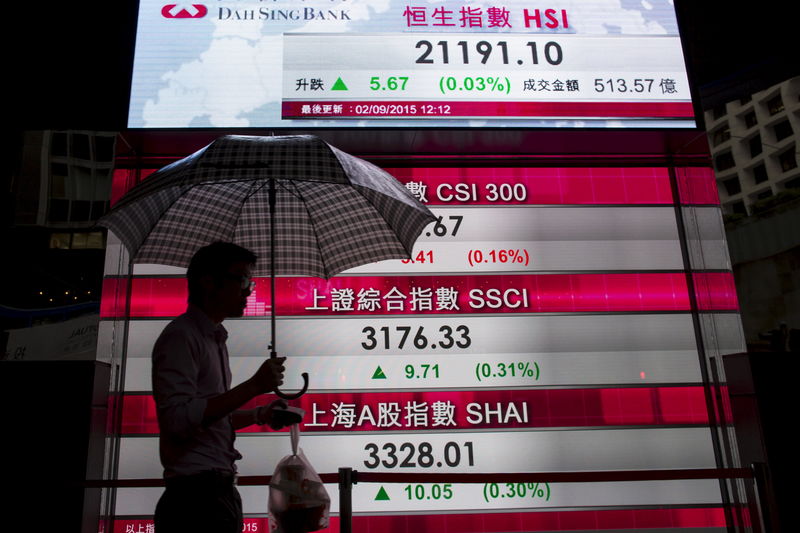
Investing.com-- Most Asian stocks fell on Thursday as rising U.S. Treasury yields pressured technology stocks, while weak economic prints from several regional economies also weighed on sentiment.
Regional markets took a weak lead-in from Wall Street, as heavyweight technology stocks fell amid pressure from high yields and as increased risk aversion saw investors lock-in recent profits.
Uncertainty over a tight presidential race and a slower pace of interest rate cuts dented Wall Street in recent sessions.
But U.S. stock index futures rose in Asian trade, buoyed by positive earnings from Tesla Inc (NASDAQ:TSLA).
Asia tech tracks US losses
Tech-heavy bourses were the worst performers in Asian trade, tracking overnight losses on Wall Street.
South Korea’s KOSPI lost 0.2%, while Hong Kong’s Hang Seng index fell 0.7%.
Tech stocks were pressured chiefly by rising U.S. Treasury yields, as markets positioned for a slower pace of interest rate cuts by the Federal Reserve.
The KOSPI was also dented by softer-than-expected gross domestic product data from South Korea, which showed the economy barely grew in the third quarter.
Still, there were some bright spots among Asian tech. South Korean memory chip giant SK Hynix Inc (KS:000660) rose 1% after posting record third quarter earnings on strong demand from artificial intelligence.
In Hong Kong, Horizon Robotics surged 28% in their first trading day after a $696 million IPO- the biggest Hong Kong IPO in 2024.
Chinese electric vehicle stocks lagged even as rival Tesla rallied sharply in aftermarket trade.
Japanese shares muted after soft PMIs
Japan’s Nikkei 225 index rose slightly, while the TOPIX shed 0.2% after purchasing managers index data showed an unexpected contraction in business activity in October. Both manufacturing and services PMIs contracted in the month.
The weak reading was largely attributed to soft economic conditions in the country, while private spending also appeared to be cooling after an initial bump earlier this year.
Sentiment towards Japanese stocks was on edge before a general election this Sunday, where the ruling Liberal Democratic Party could be pushed into seeking a coalition to retain power.
The Bank of Japan is also set to meet next week.
Broader Asian markets moved in a flat-to-low range. China’s Shanghai Shenzhen CSI 300 and Shanghai Composite indexes fell 0.6% and 0.4%, respectively, losing steam after four straight days of gains on optimism over more stimulus measures.
Australia’s ASX 200 rose 0.3% even as PMI data showed a sustained contraction in manufacturing activity. But services activity grew at a slightly faster pace in October.
Futures for India’s Nifty 50 index pointed to a mildly positive open after three days of losses.
A string of key Indian earnings are due later in the day, with a highlight being consumer goods giants ITC Ltd (NS:ITC) and Godrej Consumer Products Ltd. (NS:GOCP). Indian PMI data is also on tap.
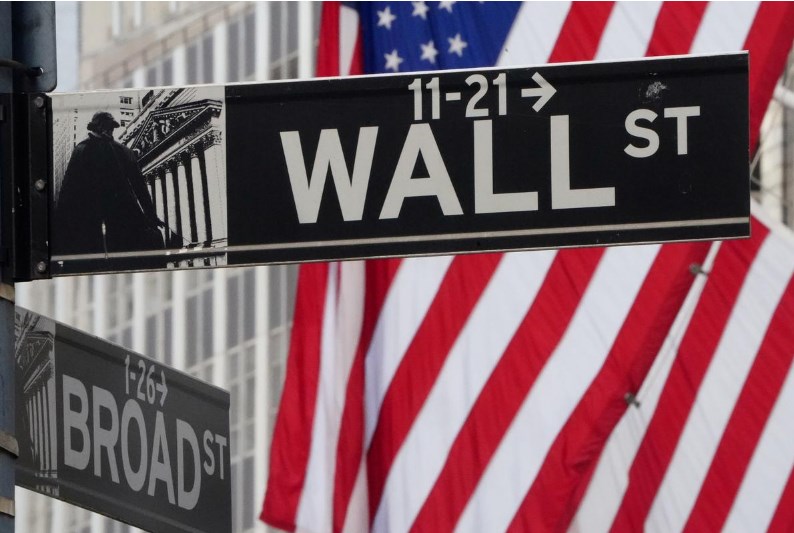
Investing.com-- S&P and Nasdaq futures rose in evening deals on Wednesday as stronger-than-expected earnings from Tesla helped improve sentiment, although Wall Street was still nursing steep losses from the session.
Futures advanced after Wall Street indexes fell sharply during the session, weighed by steep losses in heavyweight technology stocks. Anxiety over smaller interest rate cuts and the upcoming presidential election sparked profit-taking, especially after Wall Street hit record highs last week.
S&P 500 Futures rose 0.1% to 5,843.0 points, while Nasdaq 100 Futures rose 0.4% to 20,290.50 points by 19:53 ET (23:53 GMT). Dow Jones Futures lagged, falling nearly 0.2% to 42,666.0 points.
Tesla rallies 12% on stronger-than-expected Q3
Tesla Inc (NASDAQ:TSLA) rose more than 12% in aftermarket trade after clocking stronger-than-expected earnings in the third quarter, even as its vehicle deliveries for the quarter disappointed.
The earnings beat was fueled chiefly by improved margins, with the electric vehicle also forecasting a mild growth in deliveries for the year.
The improved outlook for deliveries follows nearly a year of waning growth amid increased competition in major market China and saturating EV markets in the West. The company’s attempts to diversify beyond its core automobile business, with forays into robotaxis and artificial intelligence, had also largely underwhelmed earlier in October.
The stock is the first of the so-called “Magnificent Seven” to report this earnings season, with its positive reading drumming up hopes of a similar trend from Tesla’s peers, which are due to report in the coming weeks.
Alphabet Inc (NASDAQ:GOOGL), Microsoft Corporation (NASDAQ:MSFT), Meta Platforms Inc (NASDAQ:META) and Amazon.com Inc (NASDAQ:AMZN) are set to report earnings next week.
Wall Street sinks amid election jitters, rising yields
Wall Street indexes fell on Wednesday as anticipation of a tight presidential election and relatively higher U.S. interest rates dented risk appetite. Treasury yields rose, pressuring technology stocks the most.
The S&P 500 fell 0.9% to 5,797.42 points, while the NASDAQ Composite slid 1.6% to 18,277.41 points. The Dow Jones Industrial Average fell nearly 1% to 42,514.95 points.
Focus this week is on more upcoming earnings prints, as well as key purchasing managers index data, which is set to provide more cues on the U.S. economy.

